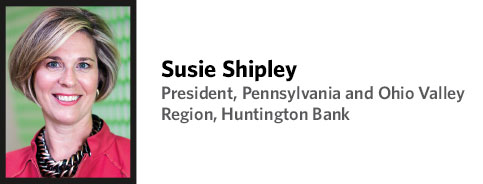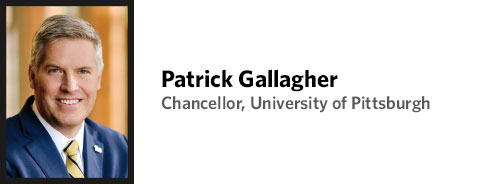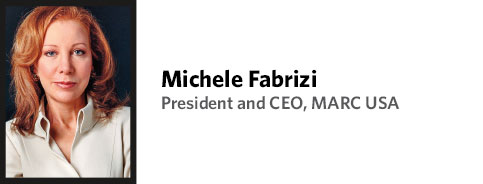Focus on Leadership

Five regional leaders address key elements and lessons of what it means to lead.
What do you believe to be the most important ingredients of successful leadership?

Susie Shipley, President, Pennsylvania and Ohio Valley Region, Huntington Bank
Successful leaders know that culture comes before strategy, character before style and vision before direction.
Successful leaders know that they cannot change the world, run a company, better the community or achieve a goal alone. They build collaborative teams around shared values. They understand that these values are not leaves in the wind—they do not waver during tough times. And they know that these values are their roots, their culture. And they recognize that culture is the “how” while strategy is the “what,” and invest their time and resources into “how you do things” in addition to “what things are done.”
Successful leaders listen to the voice inside of them—the voice that tells them right from wrong, the voice that provides a moral compass. In those quiet moments of reflection, this is the voice that helps them “own up” to their own stuff. They rise above their own self-interests to ensure that the team, the company, the community and the family interests are served. You never forget the leader who had your back, stood by you in the tough times and provided direction and support. They tend to be thoughtfully courageous and know the path to high ground.
Successful leaders use power and influence to make things better, even when it is hard. They know that real strength and real success come from a broader purpose. They take the time to share the vision (and live it) before directing actions.
Our region has many examples of successful leaders. You see it across every sector, profession and neighborhood. You see it in their work, you see it in their dedication and you see it in their actions. They make a difference.

Patrick Gallagher, Chancellor, University of Pittsburgh
My leadership role at the University of Pittsburgh is not about directing activities or issuing ultimatums. My fundamental job as chancellor is to support others by creating a platform for their success.
The strength of any great university lies in the enormous talent and creativity of its faculty, students and staff. Specifically, it is about creating the conditions where different members can work together as a community to make a positive difference and carry out an institution’s mission.
As part of this work, the most central question that I ask myself each day is: “What can I do to make the members of our university community more successful?”
The answer to this question has two parts: working to build the community and then working to support the community.
Leading to build the community means committing to excellence and providing the tools and incentives to attract the most talented people on the planet to Pitt. This includes a commitment to diversity and creating an environment that values every member as a full participant. The goal is to create such a special place that our students, faculty and staff cannot imagine wanting to be anywhere else.
Leading to support the community means fostering an environment where exceptional people can do exceptional things. This means providing individuals with the tools and resources needed to learn, teach and discover. It also involves nurturing the key dynamics—such
as creativity, collaboration, risk-taking, discourse and debate—that beget collective success.
The satisfaction of helping to build and support a university community is immense. It also carries the benefit of allowing me to work with the most exceptional people I know, which is a rich reward in itself.

Morgan O’Brien, President and CEO, Peoples Natural Gas
Leadership should occur at every level of our organization. We all have to share this responsibility. We also have to be certain that the direction of both our organization and all the levels of leadership are unified. That starts with having a culture where people share in their beliefs. We do this by always putting the customer first in our decision making. This is one of my key messages and the main driver of Peoples. It’s what we say when asked,“Why do we exist?”
We are always looking for opportunities where employees can take the initiative, shed ideas based on the status quo and embrace innovation and change. This means giving people freedom to both succeed and sometimes fail. Freedom builds leaders. I am constantly impressed at how many successful initiatives we complete. But I am even more impressed by the failures that we dissect, learn from, and then turn around to create other successes. For me, this is creative leadership, and leadership at its highest level.
It’s one thing to talk about running a company differently—with a focus on partnering with customers—but it takes time to show it. You have to believe in your heart what you’re doing, and you have to recognize that it’s a long journey to get a company and employees to embrace a vision and values of what you are and how you want to do things. As a leader, whether you’re a CEO or a group leader, it starts with believing in it and embracing it. And then, have the courage and the stamina to know that it’s a journey. In most organizations, it takes a lot of time and winning people over one by one. And it takes a lot of leaders in that organization to be successful.
What’s the toughest leadership dilemma you’ve ever faced, how did you handle it and what did you learn from it?

Michele Fabrizi, President and CEO, MARC USA
In the late 1990s, we began a series of acquisitions at MARC USA to grow our business and expand from a regional agency to one with a truly national presence. Back then, as we targeted agencies to acquire, we looked closely at their revenue, client list and geography—and less so at their internal culture and leadership.
We quickly found this was a mistake. I learned the valuable lesson that the best acquisitions are ones where there’s like-minded leadership and a cultural fit—where you’re bringing onboard leaders with the skills and passion to drive the new combined business forward—not just keep things going. As a result, we replaced the leaders in all our acquisitions fairly quickly—albeit not painlessly.
MARC USA has always been a company where we create big integrated ideas across all disciplines to achieve real business growth for our clients and ourselves. Our culture is built on high-performance teams. It takes a leadership team committed to building a whole that’s more powerful than the sum of its parts. It also takes a leadership team committed to building the next level of leaders.
This insight has informed and influenced not only all our acquisitions since the ’90s, but also all our senior leadership hires. We carefully look at balance sheets and resumes, but we don’t stop there. We look closely at leadership style, vision, demonstrated collaborative spirit, passion for innovation, comfort with disruption and vision. It’s why our alliance to create our Hispanic arm MARCA Miami nearly 15 years ago continues to thrive—with the same powerful leaders still in place today. And why our acquisition of Results Digital, now part of our Cogniscient Media group, was also such a homerun—smoothly integrating all aspects of performance-driven digital marketing into MARC USA.

Tom Johnson, Headmaster and Co-founder, The Neighborhood Academy
When Jodie Moore and I started the Neighborhood Academy, the challenges, to use a Biblical term, were legion. Creating a business and education plan, crafting a school culture, sending our first graduates off to college and maintaining a record where 100 percent of our seniors go on to college were and are some of those challenges. The challenge of my role has been rooted in managing the developmental hurdles of any organization and the ubiquitous challenge of race, class, culture and expectations of students, elements of board leadership, and some of our donors. Let me explain.
Organizations, like human beings, grow and evolve, and with that maturation process comes challenge, discomfort and the temptation to side-step the discomfort. As a start-up, we were a collection of passionately committed teachers, counselors, coaches and fundraisers fueled by faith and vision. After our first accreditation by the Pennsylvania Association of Independent Schools, we began the journey from “start-up” to “institution.” In that journey, board and donor composition changes, and institutional memory and faith also change. It is there that issues of race, class, culture and expectations become a challenge.
Serving those who have little (our students and their families) and those who have much (our board and some of our donors) has demanded a faith-filled, relentless tenacity. In serving those who have little, we teach that education, life beyond the neighborhood, and meaningful work demand sacrifices that may seem foreign. In serving some who have much, we tenaciously remind them that the lives that they and their children have led have little in common with our students and their families. I am reminded that, in the end, we are the planters; God is responsible for the harvest.




